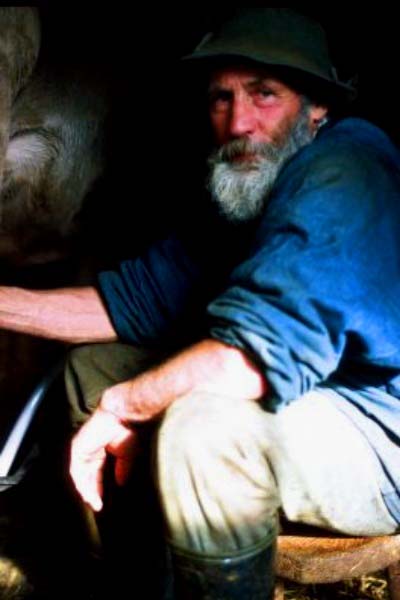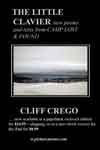
The Farming Life

The Farming
Life


The Farming Life, a small
cycle of six poems
(1) Every Valley Remembers
Two neighbors working,
tapping out the blade...
(2) Making Hay
...this is the moment
at the threshold of a new day when the heart
of every farmer forgets its scriptures and speaks
directly to the quiet land --
(3) Cutting Time
This one, the cock's foot, never used to be this high;
it sticks out like a gas station sign along side a highway.
(4) Common Names
...the name of the proverbial meadow species;
it always stands not for a plant of some kind,
but for the school he did not attend and has
been taught to think he should have.
(5) Knowing
Summer mountain, magic meadow...
(6) Sitting
Without asking,
they know where the
young men are going,
and the young men know
where the old have been...
| go to
ListeningPage:
The Farming Life (three poems)
[c. 7 ' QuickTime]; or listen in streamed RealAudio |
Every Valley Remembers
Two neighbors working,
tapping out the blade,
the complementary rhythms of
2's and 3's.
Distance and a summer breeze
do strange things to sound,
the sharp tang of heavy hammer
on anvil planted on heavy rock,
the delicate edge moves slowly
round the tapping of the blade,
a new moon moving from East
to West.
Higher up the mountain, silver
consonants ricochet off nameless
steep granite walls...
Wide awake, noon rest finished,
these sounds— were not made today.
(Urnerland, Fire Festival Time,
getting the scythes ready, making hay)
Making Hay
for Konrad and Christof
Early morning. The sun is still far behind
the high ridge to the East. From the snowfields
and forests above, countless braided streams
flow down the mountain,
converging on all sides in a single ribbon
of life, flowing down, without pause, always
flowing down. The birds are silent,
their songs of spring seem very distant
now, almost not of this place.
Like morning mist on quiet water, at this
hour, sound in the summer valley hovers close to
the ground. Only visitors from afar, if they were
here, might be the ones heard to speak too loudly.
Three men, walking slowly, steeply up
along a narrow path grown hardly visible,
the subtle weave of meadow grasses and
flowers leans down towards the earth,
heavy with morning moisture.
There is little talking. The quiet time
of the night before never seems long enough.
Higher up, at a ledge, they stop and sit for awhile;
Looking out into the distance, this is the moment
at the threshold of a new day when the heart
of every farmer forgets its scriptures and speaks
directly to the quiet land --
The ritual of hay making coming round each year,
somehow, this was meant to be, that much they
know.
"You can't bring a mower up here. Far too steep."
That's what they like to joke about. The old ways.
Three men working, one above the other -- by the
time the morning sun touches the grass they'll stop
competing, find their rhythm, put the whetstones
in the little creek that boarders a neighbor's land and
unpack the coffee.
Down moves the scythe in its broad arc, steeply,
repeatedly down,
the sweet, smooth, swishing sound
of sharp blades,
neat piles of wet grass, one above the other,
moving rhythmically, step by step, down
the mountain.
Down goes the blade, steeply down -- to make
a wild garden paradise of the earth is hard work,
some would say, good work.
That much the three men know, without saying
a single thing.
Cutting Time
Straightening the hose, the old farmer
gives the wooden tub a kick. The water
splashes around chaotically, only gradually
smoothing itself out into a smooth mirror-like
surface. He ponders his reflection..
The movements of moon and sun, wind and
weather, ought not shake the land with random,
violent extremes. This he thinks to himself.
When he was a boy, it never froze in summer.
Meadows ripen all to their own mysterious rhythm.
Some, lower down, are ready early, while
the higher ones, the steepest, are to be cut last
or not at all.
The right time to cut. He doesn't talk much
with the neighbors any more. Not that he
wouldn't. In the distant past they all worked
together.
When the time was right and the weather looked
like it would hold, they moved.Now, the worst thing
is to wake up late and somebody already has
a third of a flat meadow on the ground.
He ponders this, the right time, cutting time.
He knows the common names of a handful of grasses.
Those are the ones he watches change and ripen like a clock.
This one, the cock's foot, never used to be this high,
sticking out like a gas station sign along a highway.
"That's the fertilizer they've been using."
He taps the head of the fox's tail, a trace of yellow dust.
"Snuff," his father used to call it. Smells good.
"Not hard to cut with a scythe."
Common Names
Morning work finished, time
to rest for a while.
There are two things that will
take away a farmer's appetite
at breakfast:
One is the news in the paper
that the politicians, regardless
of the color of their party, are talking
again about cutting not hay but subsidies;
The other is the sound, even if properly
pronounced, of botanical Latin...
Pratensae vulagris, yes,
the name of the proverbial meadow species;
it always stands not for a plant of some kind,
but for the school he did not attend and has
been taught to think he should have.
So he sinks into his morning coffee
as culture's Cultivar neglectus.
The proposition,
"What is this plant?"
for him, more of a possible mistake than
a real query, a question which can fill even
an expert with fear...
"What is this plant?" A child may stop looking at
flowers forever as soon as we ask,—test, for
but a single
common name.
Knowing
Summer mountain, magic meadow,
the mysterious weave of flowers
and grasses, and weeds—
the hard question of what is native
to this place, and what is not.
But does the botanist in me always have
to point his finger inwardly, tapping off
complete indices of the species of fields
and pastures like some might look for
all the As or B-flats in
a symphony,
neatly sorted, counted, placed
in a row?
If you ask him to sing the note
of a particular plant, always,
his pitch must be perfect.
But he'll probably never confess to you,
although he'd like to, that, the more
he seems to know, the more difficult it is to
admit freely like a child to others, that,
this plant, the name of which seems
to elude him, he now sees for the
very first time.
(On the European Continent, one must venture up into the land
far above the trees, above 2000 meters or so, to enter a realm
which to this day is still entirely pristine and natural. Here we find a
place free of the confusion of false competition between largely indigenous
species—so characteristic of the lowlands—
caused by the centuries of misuse of the land.)
Sitting
Always close to the flow
of fountains,
the old sit in the forenoon
sun and are sometimes seen
holding little bouquets
of wild flowers.
Secretly, they collect
the plants themselves, but
grasp them and look at
them as if they were
gift of a child.
The light, the color,
the warmth.
They listen to the sound
of the flowing water, and
rehearse stories we know
they will never
quite tell us.
They smile their way, but
don't like to talk much
until it's almost dark.
Without asking,
they know where the
young men are going,
and the young men know
where the old have been, and
have been, again and again,
and again.
| go to
ListeningPage:
The Farming Life (three poems)
[c. 7 ' QuickTime]; or listen in streamed RealAudio |
|
back to
top | go to
Picture/Poems: Central
Display | back to PicturePage: Week
I |
Copyright © 1999 - 2002 Cliff Crego All Rights
Reserved
(Created:
IV.7.1999; Last
update:
IIII.3.20-11)
Comments to
crego@picture-poems.com